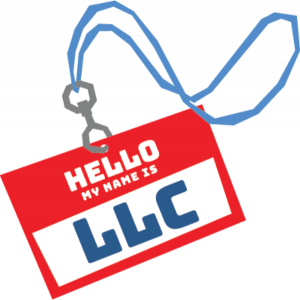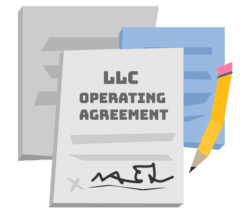How to Start an LLC in Utah
LLCs allow business owners limited liability protection, which means you are separate from your business. If done correctly, starting an LLC means your private assets are protected from the business’s debts and lawsuits. LLCs offer flexibility in both how your business can be managed and taxed.
Forming an LLC in Utah is done by filing the Certificate of Organization with the Utah Department of Commerce. First, you’ll have to sort out some basics. Don’t worry, we’ll guide you through the entire process step by step.
If you want legal advice and support before, during, or after starting your LLC in Utah, look no further than our readily available Utah Law on Call service. For only $9/month you can speak directly with our licensed Utah attorneys to further protect and plan your new business the right way.

1. Name Your LLC
Before you jump into launching your business, you’ll need to choose a name for your LLC. In Utah, there are specific rules outlined in UT Code § 48-3a-108 that you’ll want to follow. To simplify, here’s a breakdown:
- Include a business entity indicator like limited liability company, LLC, or L.L.C.
- Avoid words or abbreviations like corporation or corp that might confuse your LLC with a different type of business entity.
- Ensure that your chosen name is distinct from other businesses already operating in Utah.
Since your LLC name has to be different from other existing businesses, you can use our business name availability guide to check your name.
Tip: If you’re waiting to form your LLC, you can secure your company name for $22 and up to 120 days by filing an Application for Reservation of Business Name with the Department of Commerce, Division of Corporations and Commercial Code.

2. Claim Your Domain Name
Your domain name opens up a world of options. From launching a website, building social media profiles, setting up email communications, and printing business cards, there’s a whole lot of new-business stuff you can’t do until you choose a domain name.
When you choose your business domain, consider:
-
Does your domain work well with your business name?
-
Is your domain easy to remember and spell?
-
Is your domain available wherever else you want it, like social platforms, trademarks, or business name registries?
Once you have a domain you’re happy with, it’s time to claim it. When you order your domain through Northwest, we’ll also set you up with a website, custom built by our business website experts, hosted and secured through us. You can test drive that website completely free for 90 days.

3. Submit UT LLC Certificate of Organization
The form you’ll need to submit to officially start your LLC is called the Certificate of Organization. Once you get it in and the Utah Division of Corporations approves it, your LLC is official. Here’s what you need to fill out the form.
You’ll want to make sure it includes an entity indicator like limited liability company or LLC and that it’s unique in the state of Utah. The name you put here will be your official business name, so make sure there are no typos, misspellings, or other errors.
Tip: If you do make a mistake in your name or any other part of the form, you’ll need to file the Amendment to Certificate of Organization to the Utah Division of Corporations and pay a $37 filing fee.
The principal office address is just a fancy term for your business address. On this line, you’ll put the street address where your LLC is or will be located in Utah. If you own a home-based business, your principal office address is your home address.
Tip: To keep your personal information off of the public record, hire a registered agent who will allow you to list their address here.
Utah requires all LLCs to have a registered agent—an individual or business entity that accepts legal and state mail on behalf of your company. Utah is one of only a handful of states that distinguishes between a commercial registered agent (like us) and a non-commercial registered agent in their paperwork. Most individual and single-state agents will fall under the non-commercial category.
The requirements for a registered agent in Utah are spelled out in UT Code §16-17-302. At a minimum, your registered agent must:
- have a physical Utah street address
- maintain regular business hours at this address
- accept legal and state mail on behalf of your LLC and get them to you quickly
On this line, you’ll enter your registered agent’s name. If you’re appointing an individual, just list their name here. If you’re hiring a professional (like us), you’ll list the business’s name. You can be your own registered agent, but your business can not serve as its own registered agent in Utah.
Tip: Whoever you list here is a public point of contact for your company, and their info will be readily accessible by the public.
Your registered agent will need to have a Utah street address—this is the address you’ll put down. This is where, if you’re ever sued, the process server will deliver your service of process in person. When using a company or commercial registered agent, be sure to check that they have an office in Utah to accept your legal and state mail, like Northwest.
An LLC organizer is the person who files the Certificate of Organization. It’s okay if this person is not a part of your company. But whoever it is will have their info listed on the public record.
Tip: If you hire someone else to form your LLC (like us), they’ll sign as organizer.
Utah gives you the option of listing members or managers of your LLC. Members are what LLC owners are called, and managers are people appointed by the LLC’s members to run the business. You may include each member or manager’s name and address.
Tip: Not all LLCs have managers. If your LLC’s members (or just you, if you have a single-member LLC) are calling the shots day-to-day, your LLC doesn’t have managers.
You may indicate whether your LLC will exist indefinitely or close on a specific date.
Tip: Most folks skip this line.
A business purpose is a brief description of your business’s activity, like to run a book store or sell real estate. You can also use a general business purpose (like “any lawful business purpose”) or skip this section completely.
Utah Series LLC
Utah is one of a handful of states that allows business owners to form Series LLCs. Series LLCs are a special kind of LLC made up of one main or parent LLC with multiple LLCs registered within it called series.
Each of the LLCs has its own liability protection and is considered its own business, even within the Series LLC. To form a Utah Series LLC, you’ll need to submit a Certificate of Organization (Series Limited Liability Company) and pay a $59 filing fee.
How Do You Submit the Utah Certificate of Organization?
You’ll file (submit) your Certificate of Organization with the Department of Commerce, Division of Corporations and Commercial Code and pay a $59 filing fee. You can submit your Certificate in these ways:
Standard mail:
State of Utah
Department of Commerce
Division of Corporations and Commercial Code
P.O. Box 146705
Salt Lake City, Utah 84114-6705
In-person/express mail:
State of Utah
Department of Commerce
Division of Corporations and Commercial Code
160 East 300 South 2nd Floor
Salt Lake City, Utah 84111
OR
160 E. Broadway
Salt Lake City, Utah 84111
Fax:
(801) 530-6438
Online:

4. Adopt an LLC Operating Agreement
When it comes to running your LLC smoothly, having an operating agreement is key. Think of it as the blueprint for how your business operates, covering everything from decision-making processes to resolving internal conflicts. In Utah, operating agreements aren’t legally required.
With that being said, however, having a written operating agreement makes it easier to open a business bank account and handle any disputes that may arise down the line. Plus, it helps solidify your LLC’s limited liability status, providing an extra layer of security between you and your business.
Tip: With Northwest, you don’t have to sweat coming up with a whole operating agreement yourself. Our attorneys drafted a Utah operating agreement that you can download and use for free.

5. Get an EIN
Think of the EIN, or the Employer Identification Number, as your business’s social security number. This number is crucial for identifying your LLC on tax filings and other official documents.
You can get an EIN for free online via the IRS website, or if you prefer the old-school route, you can file a paper form. Regardless of how you obtain it, having an EIN is a must if you want to open a business bank account and safeguard your LLC’s identity.
Tip: We can get one for you.

6. Get a Business Bank Account
Now that you’ve got your LLC up and running, it’s time to tackle another important task: opening a business bank account. One of the perks of forming an LLC is that it provides a layer of legal separation between your business and personal assets. To maintain that protection, it’s essential to keep your finances separate.
When you head to the bank to set up your account, be prepared to show them a few key documents, like your operating agreement and EIN. These help establish your LLC’s legitimacy and ensure a smooth account setup process.
Tip: If your LLC has more than one member, use our LLC Resolution to Open a Bank Account.

7. File Annual Report & Pay Taxes
Utah law mandates that all LLCs file an annual report with the Department of Commerce, Division of Corporations and Commercial Code. This report is due each year on the anniversary of when you formed your business.
You can submit your report online or by mail. There’s a filing fee of $18, plus a $5 online surcharge if you opt for the digital route.
Utah Business License
In Utah, you are required to get a business license but only on the county level. There is no standard fee or form for getting your business license. You’ll need to be sure to check your county clerk’s office while starting your business to make sure you have all the licenses and permits needed to operate.

8. Get Ready for Business
Now that you’re legally ready to start making sales, it’s time to get physically ready. Depending on what your business does, this may include:
- staffing your business
- organizing your merchandise or products
- getting business insurance
Regardless of what your business does, you’ll need to get your name out to potential customers and have a way for them to get ahold of you. A good business website and business email addresses give clients a way to reach you directly. But vendors, employees, and legal agencies need a bit more formality than your website contact page.
That’s why many business owners get a Utah virtual office. Virtual offices let you organize your communication professionally no matter where you’re working from while protecting your private information.
Our Utah Virtual Office includes a unique address you can put on anything from your business cards to your invoices, a phone line with a local area code, and your choice of same-day digital scans and weekly physical mail forwarding.
Ready to Start an LLC in Utah?








